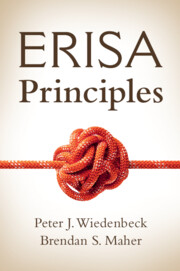Book contents
- ERISA Principles
- ERISA Principles
- Copyright page
- Contents
- Acknowledgments
- Table of Cases
- Table of Legislation
- Table of Rules and Regulations
- Part I General Considerations
- Part II Conduct Controls: Welfare and Pension Plans
- 3 Disclosure
- 4 Fiduciary Obligations
- 5 Enforcement
- 6 Preemption
- Part III Content Controls: Pension Plans
- Part IV Tax Controls: Qualified Retirement Savings
- Part V Health Plan Content Controls
- Appendix ERISA’s Legislative History
- Index
4 - Fiduciary Obligations
from Part II - Conduct Controls: Welfare and Pension Plans
Published online by Cambridge University Press: 15 February 2024
- ERISA Principles
- ERISA Principles
- Copyright page
- Contents
- Acknowledgments
- Table of Cases
- Table of Legislation
- Table of Rules and Regulations
- Part I General Considerations
- Part II Conduct Controls: Welfare and Pension Plans
- 3 Disclosure
- 4 Fiduciary Obligations
- 5 Enforcement
- 6 Preemption
- Part III Content Controls: Pension Plans
- Part IV Tax Controls: Qualified Retirement Savings
- Part V Health Plan Content Controls
- Appendix ERISA’s Legislative History
- Index
Summary
ERISA strictly regulates fiduciaries. While ERISA’s fiduciary rules were abstracted from state trust law, several important departures exist. Congress adopted a broad functional definition of fiduciary so that all decision makers – not just asset managers (traditional trustees) – can be held accountable. Importantly, however, decisions by employers respecting the design, establishment, or modification of an employee benefit plan are not fiduciary acts for they do not implicate program management (the so-called settlor versus trustee distinction). ERISA specifies a stringent set of fiduciary duties, including four major obligations: loyalty; prudence; compliance with plan terms that do not violate ERISA; and (generally) investment diversification. Plan provisions that would excuse fiduciary breach (exculpatory clauses) are explicitly barred. In addition, certain transactions involving insider dealings with the plan are prohibited regardless of fairness or whether loss ensues. Fiduciary liability with regard to participant-directed investments has received careful attention from both courts and regulators and is specially examined in the chapter.
Keywords
- Type
- Chapter
- Information
- ERISA Principles , pp. 116 - 159Publisher: Cambridge University PressPrint publication year: 2024

